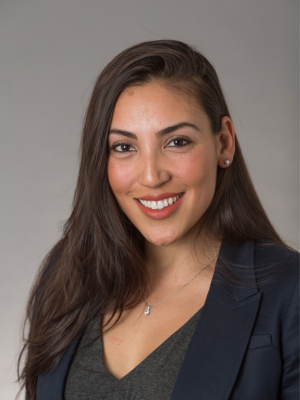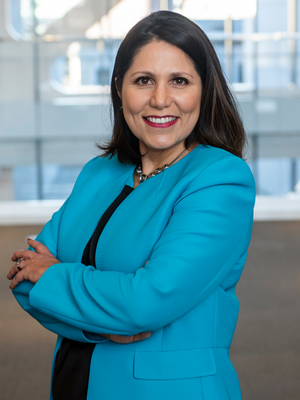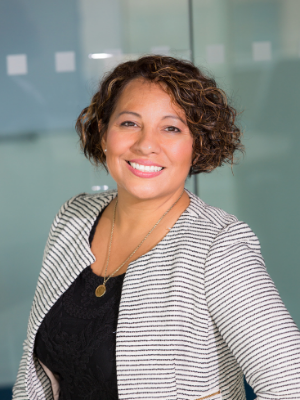 “At some stage, it’s not completely linear any longer. Sometimes, you must take a step back, or move laterally, to go forward,” says Vanessa Rodriguez. “You have to leave what you’ve exclusively done, branch out, take a risk or accept a new challenge. That could be a geographical change, a different line of business, a new company or position – but generally, it’s out of your comfort zone.”
“At some stage, it’s not completely linear any longer. Sometimes, you must take a step back, or move laterally, to go forward,” says Vanessa Rodriguez. “You have to leave what you’ve exclusively done, branch out, take a risk or accept a new challenge. That could be a geographical change, a different line of business, a new company or position – but generally, it’s out of your comfort zone.”
Rodriguez shares on interviewing for a senior promotion while becoming a mother for the first time, learning to show up authentically regardless of who is in the room, and her commitment to coming at life and work from a genuine and constructive perspective.
On A Mission Towards Affordable Housing
After completing her B.S. in Business Administration from the UC Berkeley, Haas School of Business, Rodriguez was recruited to join the Wells Fargo Financial Analyst program in the Company’s Commercial Banking business. In 2007, she moved to NYC to take a position in Wells Fargo’s Real Estate Merchant Banking business, jumping into the hot seat just before the Global Financial Crisis (GFC) hit in 2009.
“I had no clue as a young banker how bad it could or would get. I’d never seen a market cycle,” she says. “Being in commercial real estate, specifically in workouts, in NYC during the GFC was intense but an amazing and enriching experience. Three years felt like ten years and only elevated my interest in building my career in commercial real estate.” She began to rise in the ranks, leading teams in NYC and then back home again in the San Francisco Bay area. In the past couple years, she took the opportunity to further expand her real estate career by becoming the Group Head of Wells Fargo’s Community Lending and Investment (CLI) group.
“Affordable housing is one of the Bank’s top priorities, and this was an opportunity to lead a premier affordable housing team and large national business at Wells Fargo,” says Rodriguez. “It’s exciting to look at commercial real estate from a different angle and immerse myself in this new ecosystem – which includes non-profits, housing authorities, foundation work, government and community relations, public policy state and local governments.”
Rodriguez notes that providing a quality, affordable home to all must be a top priority everywhere in the US. In the San Francisco Bay Area, many of the families and friends she grew up with have had to relocate to attain good, cost-effective housing. Some now have 2-3 hour super commutes to work.
“It’s really sad when you become priced out of the place that you grew up, and that’s happening for more and more people across the country,” she says. “There are so many amazing things here in the Bay Area- the outdoors, the moderate climate, the diverse culture, so many top notch universities, the innovative tech industry, think tanks and VCs. But the downside is an extremely high cost of living in which regular people are forced out, breaking up families and communities, and negatively impacting the landscape. We need to work on these problems in communities across the country, and I want to be a part of that solution.”
Taking a New Role While Welcoming Her First Born
At a certain point as you ascend in leadership, Rodriguez notes that the path can become less clear. What your next step will be depends on investing in a lot of self-reflection and soul-searching around core questions: What do you want to do? How do you want to spend your time? Where can you add the most value? Because ultimately nobody else is going to be equipped to hand you those answers.
Such a moment came for Rodriguez when she was 41 years old and seven months pregnant with her first baby in 2021. The opportunity to run Wells Fargo’s CLI group came up, and she “looked away, frankly.”
“This is the value of having those strong personal and professional relationships in your life, whether they are formal or informal mentors or sponsors or ultimately over time perhaps become friends after years of working together” she says. “I had some of these people call me and say, ‘Don’t look away from this. It’s probably tough to think about a new opportunity now or interviewing for a new role at eight months pregnant, but do not check out right now.’”
So, despite how daunting it felt, Rodriguez began the interviewing process while pregnant in her third trimester, finished while on maternity leave, and ultimately returned to work in a new position. She had a second child in November 2022, and appreciates Wells Fargo for the support she’s received: assuming the role at this stage in her life has included managing her own high expectations around her career and motherhood, working hard to deliver, but speaking up where flexibility is needed. Rodriguez is inspired that while there are many things about parenthood that remain unique to women, parental matters are seen less and less as only women’s issues.
“But I will say that every day, I am forced to make decisions about where I am most needed because there are only so many hours in the day,” she admits. “I would love to get up every day and have my set routine, but my current state is more like a Rubik’s cube, where I move this piece down, pull it up here, take the lever off here, and make tough decisions about what I can and can’t do today. The truth is it’s not always graceful but tomorrow is always another chance to improve and do it better.”
Building Your Personal and Authentic Brand
“From the beginning of my career, I always focused on treating every single task like it was very important. It was all about building my personal brand,” she notes. “I tell young people: ‘You need to sweat the small things as well as the big things as you build your brand. Make your mark. What do you stand for? What are your standards on the quality of your work product and how do you approach it?’ Because if you build that personal brand and do great work for people, there is a multiplier effect where people start asking for you and saying your name in the room when you’re not there.”
Yet keeping your head down isn’t enough. Rodriguez also focused on real estate being a people business, and the importance of connecting, regardless of whether she may have initially felt like an outsider, to gain a strong network and the right visibility. Rising into that confidence to bring more of herself to the table has been immensely important to her growth.
“Twenty years ago, I entered the space focusing on being less visible. Over time, I realized there is a lot lost when you try to fit the mold, when you do not bring your full self to work, your best self to work” says Rodriguez. “We can and should bring our personal style and unique experience to work and connect in different ways. I certainly would encourage that in a sea of many, be memorable.”
Being extremely competent, authentic and walking the walk are important to Rodriguez’s sense of personal brand. As a leader, she never asks anyone to do something she hasn’t done or wouldn’t do herself. She prefers to roll up her sleeves. She values genuine and transparent communication and people feeling comfortable enough to share their unique perspectives.
“I want to bring value to people, whether it’s my clients, my team, or senior management, and what it means to bring value is going to be different for every situation,” she notes. “I hope that when I’m not in the room, people say she brings leadership value everyday, and she brings it in an authentic and genuine way – and we enjoy being in her orbit.”
Belonging, Irrespective of the Room
When it comes to entering a room where she may be the only woman, let alone the only Latina, Rodriguez says, “It starts with whether any of those factors intimidate you. I’ve always just prided myself on not being intimidated, even if there were moments I could have been.”
“When I enter the room, I focus on being prepared for the content of the meeting, on being a good listener, on finding solutions,” she says. “I focus on the principles that matter, irrespective of who’s in the room and whether you’re the only woman.”
While she’s had many moments of feeling she wasn’t part of the club and remembers once being told it was a career-limiting move not to golf, Rodriguez comes back to her confidence in the subject matter and being memorable because of her difference.
While twenty years ago, she may have gone with a strategy of blending in, today she would advise: “Embrace who you are and everybody else will be richer for it.”
Maintaining A Constructive Mindset
“There’s a moment, which is certainly an adjustment, when you’ve reached the point in your career where the buck stops with you in leadership. I’ve always been someone that took responsibility and was willing to make decisions, but when you get to the level where you have complete ownership from start to finish, it’s no longer someone else’s problem in leadership,” she says. “It’s ‘we’ and it’s ‘me.’ You’re not alone – you have peers, a whole team, a manager – but it’s embracing an entirely new level of ownership and responsibility.”
At that level, Rodriguez has embraced the advice to be vigilant with her mental approach, day-to-day and in all parts of life.
“How constructively you approach anything is going to be the difference-maker for you and for all those who work with you and for you,” she says, “When you hit those roadblocks and it’s tempting to pivot to feeling captive or negative, I force myself to remember that the only way out is forward. Approach issues constructively and that will help you rise above the challenge or circumstance, to focus on a solution.”
She continues, “I’ve needed that encouragement at times. We could waste time wallowing, but the work will be there tomorrow. So give yourself a few minutes, if you need to take a step away, do. But then, come back to it, calmly and constructively. That’s what I want to exemplify for my team, the leader I want to be. Cooler heads will always prevail.”
Keeping the Perspective of a Longer Arc
Twenty years into her work journey, Rodriguez would also advise that it’s okay to slow down and pace yourself: “If we’re lucky, the career is long. We live in a culture of instant gratification and are wired to constantly seek it. Technology only serves to reinforce and accelerate the need for instant gratification,” she notes. “But you truly have to toil away at something to really learn it, to master it, to become an expert, to unlock the benefits and skills that will propel you to that next level. The corporate ladder is really a staircase with various landings along the way and you have to play the long game. Climb the staircase…”
With two little ones at home, Rodriguez observes that “six months feels like a night” and time feels more precious than ever. Rodriguez loves spending time with her kids, husband and extended family. She’s seeking to weave back in her wellness focus and routine, and having enjoyed much travel before motherhood, muses on family travels to one day come.



